#which also presumably serves as their weak point and they get recalled from battle if the projector is damaged
Text
Just got to the point in Voyager where the Doctor gets a mobile holo-emitter, and maybe we're crossing fandoms that shouldn't be crossed, but they totally just went and made the Doctor a Crystal Gem didn't they?
#a humanoid body projected from a tiny device on their person#which also presumably serves as their weak point and they get recalled from battle if the projector is damaged#like enough “so and so” is a magical girl#the doctor from voyager is a crystal gem#star trek#voyager#star trek voyager#st voyager#the doctor voyager#crystal gems#steven universe#crossing the fandoms uwu
2 notes
·
View notes
Text
The Brightest Thing - A Griffith Analysis
Part Three - you made Griffith weak
Part One
Part Two
To Griffith, the dream is emotional security. It’s assurance that if he’s dirty, then it’s because it’s necessary to be so, so he can keep winning for the sake of the dead. It’s a way for him to repress his guilt and self loathing, because when he gets that kingdom-shaped seal of approval, it will have been worth it.
So when I say that Griffith’s relationship with Guts is beginning to replace the dream, that’s what I mean - rather than relying on the dream to reassure himself that everything he’s done, even his very existence, is worthwhile, he could rely on Guts for that. He starts opening up to Guts, rather than repressing through his dream.
Despite Griffith's Promrose Hall speech, nothing actually changes on his end. He prioritizes Guts above the dream again when he sends a search party after him and Casca despite the nobles he’s trying to suck up to telling him he shouldn’t. He drops everything during the Battle of Doldrey to have a quiet panic attack when Guts’ sword breaks. His first reaction upon achieving a huge milestone on the path to his dream when the Band is officially integrated into the royal army is to find Guts and share the moment with him.

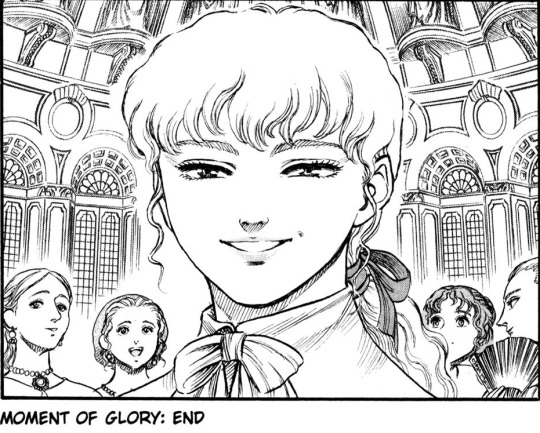
And boy I love how the chapter that depicts Griffith’s moment of triumph for his dream ends with Griffith just smiling at Guts across a vast ballroom.
The story between Promrose and the end of the war is filled with little moments that are suggestive of Griffith’s reliance on Guts. Another of my favourites:
I just hope he stays calm and composed.

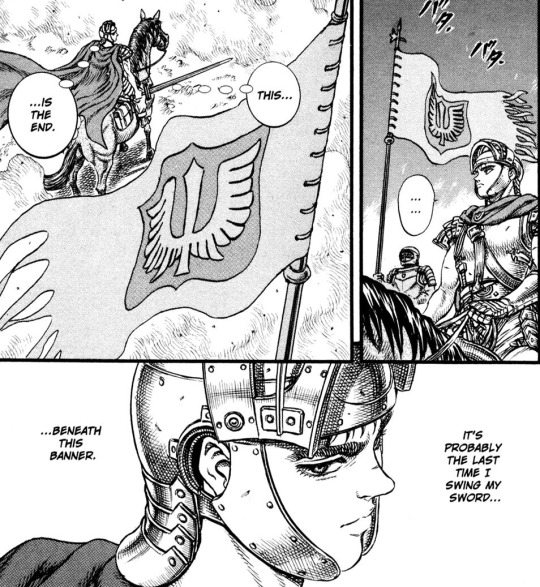
Casca worried that volunteering to defeat an army of thirty thousand with five thousand men might be an act of recklessness because a predatory pedophile who took advantage of Griffith’s extreme self loathing when he was like fourteen is the leader of that army? Naaaaaah impossible, Griffith would never let that faze him. Oh and speaking of Griffith being calm and composed, this is my last battle, it’s almost time to leave.
But Tombstone of Flame is the main attraction here.

This is the second night of assassinations, and it’s a neat mirror to the first. Where Guts came away from Julius’ assassination consumed with inadequacy, self-loathing, and generally feeling like a monster, now it’s Griffith who comes away totally fucked up and filled with self hatred.
Between Promrose and Tombstone we learn Griffith’s backstory. This adds to the mirror image effect between these assassinations by revealing Griffith’s insecurities to us so we can understand his perspective, and it serves as its own parallel to this scene.
And this is the scene where we see that not only does Guts surpass the dream in importance to Griffith, but he could have potentially become a much more emotionally healthy alternative to it. This is where we see how Griffith could have not just prioritized Guts, but replaced the function of the dream with his relationship with Guts.
And I want to emphasize the emotionally healthier part. One of Berserk’s most consistent themes imo is that relationships with others are a superior way of dealing with your issues compared to dreams and swords.
eg, Godo, our favourite dispenser of wisdom, has some pretty telling lines to that effect.
You were right beside those irreplacable things... yet you couldn’t bear to immerse yourself together in sorrow with them. So instead... you ran away so that your own malice could burn inside you.
Guts’ personal growth post-Eclipse is associated with making friends; his backsliding and mistakes are associated with going off on his own to fight monsters; he begins to overcome his revulsion to touch when he becomes part of the Hawks;

on the rooftop after the Zodd conversation Guts recalled the night he killed Gambino and wondered if this was the answer he’d been searching for since then (family) before dedicating his sword to Griffith; part of his healing process for his childhood trauma is talking about it to Casca; etc. And Guts and Griffith’s relationship is very much included, even though it’s far more of a tragic missed opportunity.
The second half of Tombstone of Flame Part 2, aka my favourite chapter of Berserk, abruptly shifts tone from triumph and pure badassery to quiet, contemplative vulnerability halfway through. As a chapter I feel like it really encompasses the highs and lows of Griffith’s character, from defeating his enemies and cooly predicting Foss’ actions to wrap everything up in a neat little bow, to highlighting his guilt, self-loathing, and emotional dependency on Guts.
Here, Griffith opens up to Guts in an intensely vulnerable moment.
I involved you in this filthy scheme... and I didn’t even get my hands dirty. I left all the dangerous, taxing work to you...

Idiot! What kinda question’s that for the guy who killed a hundred men?


This is another scene the significance of which cannot be overstated. There’s so much to unpack here I hardly know where to start. Like... this is the moment. This is what Griffith flashes back to when he’s fucking Charlotte and burning his life down around him. This is a moment Guts remembers when slowly realizing that Griffith loves him. This is what the Godhand shows Griffith to get him to agree to make the sacrifice. Guts remembers this after Griffith makes the sacrifice. This moment is basically the linchpin of Berserk.
This is both a mirror to Guts overhearing the Promrose Hall speech, and a call-back to Griffith in the river after Gennon.
So first, the set-up of this chapter recalls Promrose Hall strongly. It’s the second night of assassinations, Promrose Hall took place on the first night. When Guts assassinated Julius he came away from that encounter wracked with guilt over accidentally killing Adonis as well, strongly and traumatically reminded of his childhood, and basically thinking of himself as a monster in a way inseparable from his own childhood trauma:



Guts is consumed with self-loathing, comparing himself to monsters like Zodd overtly, and like Donovan symbolically. He’s also reminded of killing Gambino, like, basically this event just brings a pile of old issues crashing down on Guts’ head.
In a concussed daze he wants nothing but to find Griffith, presumably for reassurance. I don’t want to get too heavily into Guts’ side of things here, but remember that this is shortly after he dedicated himself to Griffith when Griffith told him he risked his life for him for no reason. I think it’s safe to say that he wants that reassurance again, he wants to feel the same sense of being valued and respected that he got during that staircase conversation.
And instead he overhears Griffith telling Charlotte that he has no friends. More to the point, what he gets is Griffith’s dream blocking the emotional bridge that Guts is trying to cross like a troll.
In Tombstone, Guts and Griffith assassinate the Queen and this time it’s Griffith who turns to Guts for emotional reassurance in a moment of vulnerability.
The way killing Adonis reminds Guts of his many, many issues is echoed in the strong parallel between Tombstone and Griffith in the river. We don’t get to see what’s going through Griffith’s head the way we see into Guts’, but we can infer an awful lot based on this comparison.
In the river, Griffith asked someone for reassurance after doing something he considers shameful for the sake of his dream.
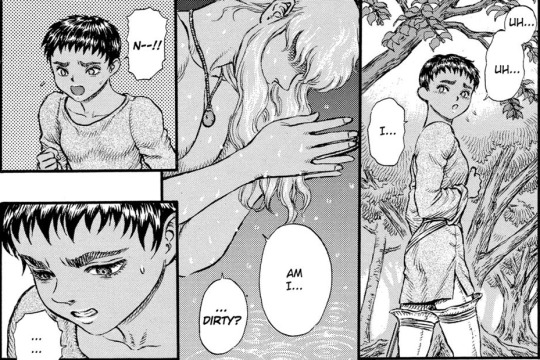
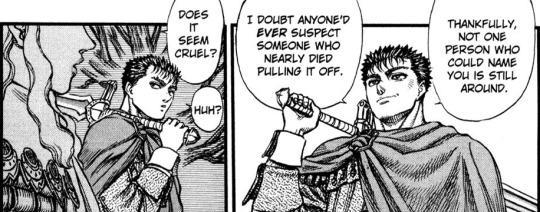
Casca’s response isn’t all that reassuring.

She cuts herself off in the process of automatically reassuring him and instead she asks why he was with Gennon. This is totally understandable and not at all something I blame Casca for lol. She’s a kid, she’s understandably disgusted at the thought of Griffith having sex with Gennon willingly knowing that he’s a pedophile, and she’s out of her depth in a highly charged, difficult discussion. But that doesn’t change the fact that Griffith probably took her answer as a “yes.”
Griffith then goes into his self-harming dream spiel, as he reiterates to himself exactly why it was worth it to dirty himself for his dream while tearing open his arms. What may have been his first attempt to open up to someone else in a moment of extreme emotional vulnerability was shut down, inadvertently, so he violently returns to his original justification and defense mechanism, his dream.
The saddest thing about Tombstone, to me, is that this time Guts brings up the dream for him.
Ain’t this part of the path to your dream? You believe that, don’t you?
Guts’ answer is a depressing double-whammy of both implicitly agreeing that Griffith is cruel, and reminding him that the cruelty is necessary to achieve his goals. This second time we see Griffith try to open up to someone is also shut down, inadvertently, and the fact that Guts is the one to bring up his dream this time rather than Griffith tells us that the dream wasn’t even on his mind. Guts’ answer comes as a very painful reminder.
Like, imo this is huge. In the first part of this meta I tried to show how wholly reliant Griffith is on his dream. It’s what he clings to as his shield against his intense self-loathing and guilt. It’s a way for him to tell himself that everything awful and dirty that he’s done was worth it, and that one day he’ll be able to prove that.
Well this moment shows Griffith forgetting all that in the face of Guts’ potential acceptance, until Guts reminds him and his self loathing comes crashing down on him all at once.
If his dream was what he turned to for validation from fate or some higher power, then now Guts is who he turns to for validation. He needs Guts’ reassurance that he isn’t cruel. He needs Guts to see his “dirty side” and continue to remain by his side - that is all the validation he needs now. Not fate, not a kingdom, just love.
The same way the only thing Guts needed in order to feel like he was where he belonged wasn’t his own dream, but the knowledge that Griffith loved him, the knowledge that he had after their staircase conversation about Zodd, and which dissolved after Promrose.
But instead Guts, with Griffith’s dream on his mind getting in between them again, says the wrong thing and Griffith looks the exact same way he looked when he felt like he was responsible for a kid’s death.
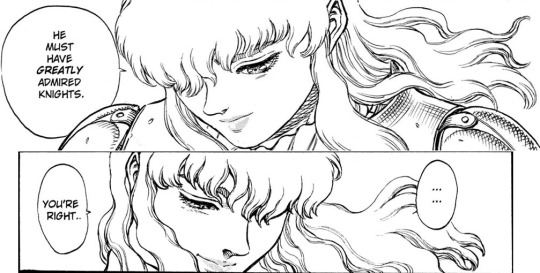
So, to sum up, Griffith feels self-loathing, tries to open up to other people to assuage his sense of self-loathing in the hope that, having seen him at his worst, they don’t see him as filthy/cruel the way he sees himself, and each time his self loathing is only reinforced. The first time he clings to his dream in lieu of Casca’s reassurance, while the second time Guts is the one who brings up his dream, in so many words pushing Griffith away and telling him to cling to the dream instead of him.
Each time the dream serves as a replacement for real human connection and love.
The first time Griffith was able to close himself off, place a hand on her shoulder, and tell Casca, “it’s nothing,” when he realized how emotionally vulnerable he was in that moment. But when it comes to Guts, he’s much too far gone to separate himself and play the perfect leader.
Now, as opposed to putting the mask of perfection on and saying, “it’s nothing,” with Guts he says:



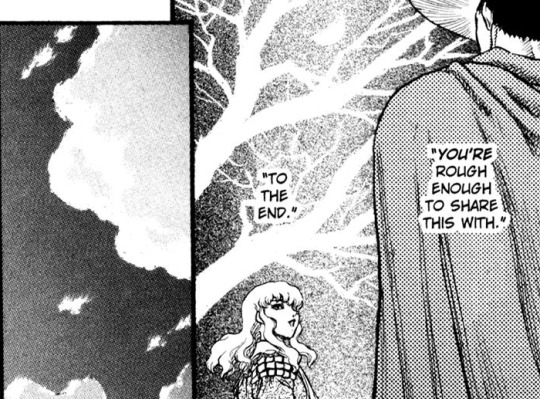
Unlike Promrose Hall, Guts putting the dream in between him and Griffith and thwarting Griffith’s efforts to open up to him and take comfort in his potential reassurance doesn’t immediately ruin their relationship. I’d say that Griffith is very accustomed to seeing himself as a monster by now, so while Guts’ implicit confirmation of that fact is incredibly fucking depressing considering what could have been, it’s nothing Griffith didn’t expect to hear.
Guts remains the man allowed to see behind the mask and into the real him.
And then there’s this contrast:
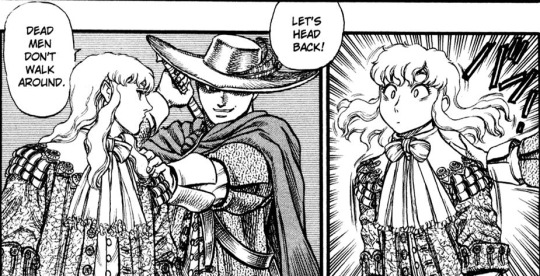
This is depicted as a cute moment, but it’s also indicative of how utterly weak and emotionally vulnerable Griffith is now that he’s let Guts in. With Casca he was still able to step back and remove himself, put the mask back on, and be the one to comfort her despite clearly needing it more.
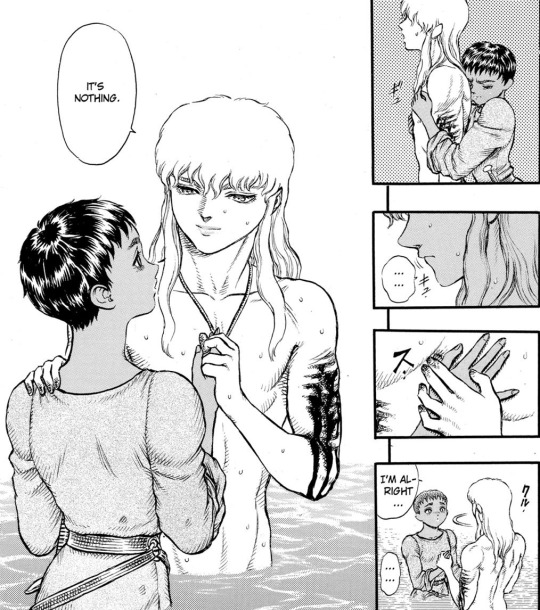
Now Guts is the one to put his hand on Griffith’s shoulder. It’s not depicted as a hugely significant and character revealing action the way this moment in the river is, but it’s a perfect illustration of what Griffith finally realizes after it’s too late:
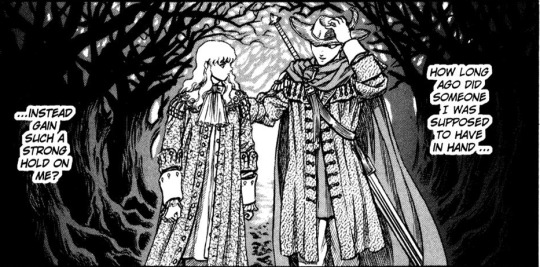
And it’s exactly the moment Miura uses to show us how emotionally vulnerable Griffith has become to Guts. Griffith couldn’t separate himself when he tried, and now he doesn’t try, he just accepts Guts’ assessment that his cruelty is necessary with a sad smile, and intends to continue on with Guts at his side.
Finally, there’s seemingly one thing missing from this comparison between Griffith in the river and Griffith in Tombstone of Flame: the self harm.
But, well, it’s not actually missing, we just don’t get to see it until a month later:
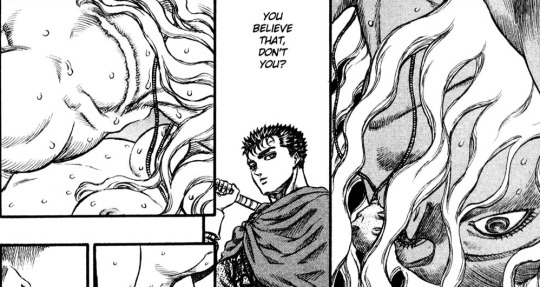
And the reason we’re not shown Griffith’s self-harm scratches*** until this scene is because it’s actually another big contrast between Griffith’s reaction to Casca and his reaction to Guts.
Presumably, based on the other parallels I drew between Tombstone and Casca’s flashback, and based on the placement of these panels - Griffith’s memory of Guts reminding him about his dream and questioning Griffith’s resolve followed immediately by our first glimpse of those scratch marks on Griffith’s shoulder - Griffith self-harmed at some point closely following the assassinations.
One can imagine it following exactly the same pattern we saw with Casca: Griffith asks someone if they think he’s X thing he hates about himself, doesn’t hear a no, and then some time following he reinforces his resolve, tells himself that it’s ok, it’s necessary for him to do these dirty, cruel things for the sake of achieving his all-important dream, for the sake of the people who have given their lives for it, for the sake of making their sacrifices meaningful, etc, while self-harming. Just like he did in the river.
The contrast comes now, after Guts has left.
Griffith could probably convince himself after Tombstone that the things he does for the sake of his dream are necessary and important and it’s worth becoming a monster to achieve his goal. “You believe that, don’t you?” Guts had to remind him, but Griffith agrees. “You’re right.”
But after Guts leaves him?
When Guts leaves, Griffith takes it as a rejection. Those little moments that by themselves never ruined their relationship or amounted to more than mild rebuffs have probably turned into wholesale condemnations in Griffith’s mind. Guts saying, “just order me to do it,” goes from a mild reminder that they don’t have an equal relationship to, “I won’t dirty myself voluntarily, but I’ll do it if you order me to because that’s my job.” Guts saying, “ain’t this part of the path to your dream?” turns into, “your dream is paved with cruelty and I’m sick of being dragged through the dirt with you.”
Griffith winning Guts’ loyalty in a fight turns into Guts being forced to associate with him, and leaving as soon as he’s accomplished what he thinks Griffith wanted him for, thereby fulfilling his end of the bargain.

The moment Griffith is remembering here is our first glimpse of them together. “It’s funny... you’re the first person I’ve ever spoken to like this.” It’s a memory of Griffith choosing to open up to someone and share his innermost thoughts for the very first time. And he’s convincing himself that Guts was disgusted by him from the very first glimpse he got of the Griffith underneath the perfect image, and wanted to escape him since the beginning.
Ironically, we know exactly how Guts felt in this moment: “At that time he shone before me as something beautiful, noble, and larger than life.” It makes the choice of this particular memory all the more painful.
The other thing this particular memory signifies is Griffith’s driving motivation behind his dream. This is the scene where he tells Guts all about his belief in fate and his desire to know what he’s destined for - it’s our first indication of what Griffith’s dream means to him. It’s a contrast: Griffith then, just beginning to open up to Guts and explaining the pragmatic philosophy behind his dream, and Griffith now, falling to pieces because he believes Guts is rejecting him.
In other words, Griffith then, reliant on his dream, vs Griffith now, reliant on Guts.
The very fact that Griffith is the one challenging him, refusing to let Guts go without a fight demonstrates how far the dream is from Griffith’s mind. Remember how important it is for the Hawks to choose to follow him? How even when Guts first joined, the duel and the stakes were chosen entirely by Guts and Griffith just went along with it? Now that’s not even a factor. The feelings of guilt lying just below Griffith’s surface don’t matter at all in the face of Guts leaving. Griffith is now so far beyond distancing himself from Guts with reminders that he may die for his dream that he’s willing to risk killing him directly, in an irrational attempt to negate Guts’ rejection.
“I guess it’s because they themselves chose to fight,” is a careful rationalization, and Griffith is no longer anywhere close to capable of rationalization in this moment. This is what happens when the emotions he buries and spends his life denying burst to the surface. Despite being more emotionally open with him than he’s ever been with anyone before, he’s never put a label on his feelings for Guts and never even identified them to himself. He asks Guts, “do I need a reason each time I put myself in harm’s way for your sake?” he tells Guts, “it’s for those reasons that I’m asking you to do this,” he tells Guts, “you’re rough enough to share this with. To the end,” he tells Guts, “you’re the first person I’ve ever spoken to like this,” but he never tells Guts that he cares for him, prioritizes him, trusts him, loves him, and I don’t think he’s ever told himself either.
Having ignored and rationalized away his emotions for most of his life, now he’s finally run out of logic and rationalizations. He has no experience dealing with feelings like this because he lives in denial of them; I genuinely don’t think he himself understands what he’s feeling or why as Guts announces that he’s leaving, so he ends up lashing out through an established framework that he does understand, that Guts himself once suggested as a way to win his loyalty, that, might I point out, Judeau, Corkus, and Pippin all think is reasonable, and Guts is reassured by lol.
Griffith won Guts in a fight, so Griffith will keep Guts through another fight, because he can’t bear the thought of Guts rejecting him.
Which brings me back to the scratch marks on his shoulder.
He remembers the moment Guts implicitly agreed that Griffith is cruel and called his resolve into question. “You believe that, don’t you?”
A month earlier his answer was yes. He scratched himself and told himself that everything was necessary for the sake of his dream.
Here’s his answer now:


No.
He doesn’t scratch himself - he traces the marks, trying to remind himself that yes, it’s worth becoming a monster for the sake of his dream, even if it drove Guts away... but it isn’t. Now instead of self-harming he curls up and cries. No blood this time, just tears.
Griffith scratching himself is tied to affirming his dream and repressing his feelings of self-loathing, and the pointed absence of scratching here tells us that he can no longer affirm his dream or repress his self-loathing. It’s not worth dirtying himself for, it’s not worth the deaths on his head, it’s not worth becoming a monster, because that, he believes, is why Guts left, and nothing was worth losing Guts, not even his dream.
This whole sequence with Charlotte*** is Griffith’s attempt to fall back on his dream after losing Guts. Charlotte represents his dream perfectly - Judeau even reminds the audience of that fact in the chapter preceding the second duel (chapter 34). The key to his dream is Charlotte, and Griffith showing up at her window is an irrational attempt to attain his dream now, no matter how premature it is, because he is in dire need of the emotional reassurance his dream provides him.
Guts is gone, seemingly having rejected him, and Griffith retreats to his dream the way it’s always been a defense against his self-loathing and a way of repressing his emotions.
Take all the frightening and sad things... and cast them into the fire.
But again, it doesn’t work this time - it’s not enough to cope with the loss of Guts.
I think there is also a strong component of self-destruction here. Griffith knows how risky sleeping with Charlotte is, she even points it out while he’s standing in a tree outside her window. The King alludes to Griffith “destroying himself,” as well, and everyone and their horse except Corkus, stubbornly, connects Griffith’s meltdown after Guts left to the way he and the Hawks are declared traitors the next morning. It may not be a planned suicide, but it’s an act of self-immolation just the same, and something Griffith did knowing the risks full-well.
It’s no surprise when he lands himself in a dungeon.


Oh this chapter. This chapter this chapter this chapter. I’ll admit, it’s been giving me some trouble, not because it doesn’t fit with my point, but because it fits too well lol. I debated for a long time whether I’d try really delving into it or whether I’d omit some stuff and just like, ignore the fact that I genuinely believe this is the meaning behind it.
But lbr I’m taking the first option, as hard as it’s been to find a way to talk about this shit that doesn’t like... give entirely the wrong impression, because it’s basically the capstone to this part of Griffith’s character arc, and therefore this part of this meta, and it encapsulates everything about Griffith’s self-loathing perfectly.
Everything he calls the King out on is something he hates about himself.
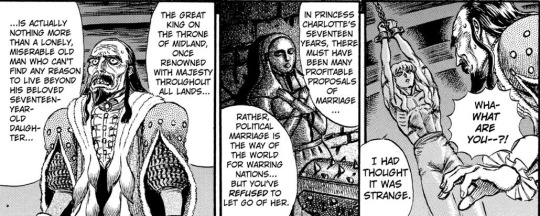
You’ve lived on by resigning yourself to the monster [war] you envision. But you’ve by no means tried to harness that monster.

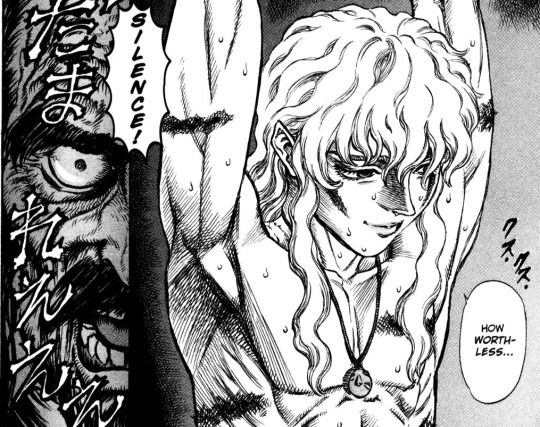
The second part is fairly obvious. The King was born to the throne and didn’t even bother to use his power for anything worthwhile. Griffith wasn’t born into that power but he spent his life trying to attain it, and just as he was about to succeed he threw it away, ultimately accomplishing nothing. "This is... worthless.” Both of them failed to utilize that power.
The first part, the mockery of the King’s feelings for Charlotte, was the part that tripped me up for a while, because frankly, it’s such a clear parallel to Griffith’s feelings for Guts, to the point where when I tried to write this section while ignoring it it felt like a really glaring omission, but oh man, let’s be real here, it’s unpleasant as fuck.
I’m choosing to give Miura the benefit of the doubt because while I don’t think he’s above comparing gay pining to incestuous rape, I do think, as I’ve said, that this scene is about Griffith’s self loathing, and Griffith considering his own feelings to be just as pathetic and grotesque as the King’s lust for his daughter makes a depressing amount of sense to me.
First I want to explain why this parallel is so clear to me because I’d hate to look like I’m making this up. So first, once we’re agreed that the King bemoaning the weight of lives on his shoulders and assuming Griffith has no idea what that’s like, and getting a very knowing look from Griffith in response, is as clear a parallel between Griffith and the King as you get, I feel like it’s impossible to ignore how neatly obsessive love for someone fits in as well.
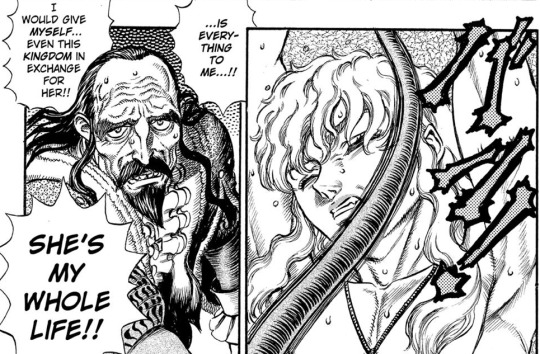
Griffith’s feelings for Guts have been defined by giving himself in exchange for him, risking his life and his dream/kingdom for him, as Casca points out at every possible opportunity. And now he finally has given up a kingdom for him - or at least, because of him.***
We know why Griffith is in that dungeon. Griffith knows why he’s in that dungeon. (“He was the reason I’ve been thrown into this darkness”) Casca knows why he’s in that dungeon. (“Because you left us! Because you abandoned Griffith!”) Rickert, a little kid, knows why he’s in that dungeon. (“What I think is... it must’ve been over you, Guts.”) Eventually even Guts gets a clue. (“Was I the one who brought all this upon you?”)
Like, just to reiterate the main point of this meta, Griffith’s narrative so far is about becoming emotionally reliant on Guts as a defense against the weight of death on his shoulders, instead of the dream which had been his defense until Guts. This scene is about the King’s emotional reliance on Charlotte as a defense against the weight of death on his shoulders instead of using the “sword called the throne” to defend himself against that weight by doing something worthwhile with it - something to justify what the King’s subjects have been dying for.
And it’s no coincidence that the throne is described as a sword.

In Berserk, swords are coping mechanisms. Griffith is mocking the King for his emotional dependence on someone else to shield his heart rather than using his “sword” for that purpose, which is, of course, exactly what led to Griffith ending up in a dungeon.
The King goes on this diatribe:
I would give myself... even this kingdom in exchange for her! She’s my whole life!
What value is there in this world? Wars rage on and the people’s lives are lost like they were insects! After how many decades of war and how many tens of thousands of corpses, we’ve finally built a time of remembered peace, but it’s only for an instant! On the underside, the monster named war is always seeking new blood, starting to brew itself anew! In the face of that monster, the will of one land’s king is powerless! The wisdom of one man is folly! And yet I cannot cease being king! There’s no way I can stop! In this... blood stained, meaningless world... if there is one single ray of hope to be found... it is... warmth. Only warmth covers and protects me from this world.
You’ve taken that one flower that gives me that warmth... and plucked it! Unforgiveable!
Alas, my poor Charlotte. I’ve brought her up for seventeen years. She knowing no impurity... now that she’s given herself up to the sport of a commoner... I’d rather that... rather that...
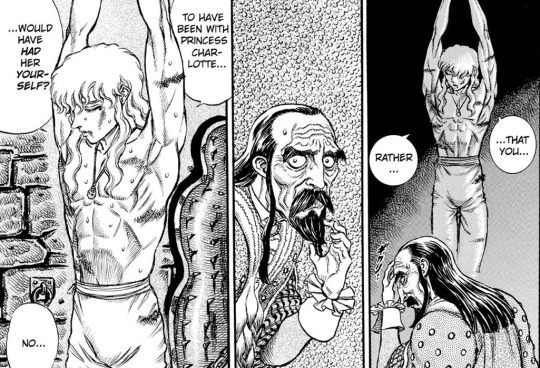

Directly from the King lamenting that monster called war and the lives lost to it, to declaring Charlotte his one defense against the world. His one means of protection from the weight of “the lives of all the people, all on [his] shoulders.”
Again, Guts was becoming Griffith’s defense against his feelings of guilt. A large portion of Griffith’s story revolves around how his relationship with Guts is in part a coping mechanism, a defense against self-loathing.
And not in a negative way - remember, compared to dreams and swords as coping mechanisms, finding emotional support in a connection with someone else is by far the superior option, according to Berserk as a whole.
Griffith’s expression of his feelings for Guts wasn’t altogether healthy, because Griffith is not altogether emotionally healthy lol. He’s an extremely repressed guilt-ridden obsessive dude who self harms and thinks achieving an arbitrary goal will justify his existence, and who fell in love, had no way to understand those feelings, and became very emotionally dependent without even noticing.
Hence freaking the fuck out, challenging Guts to a duel and thinking as he strikes that he’d rather kill him than let Guts reject him. But despite that, overall, we’re shown that Griffith’s feelings for and relationship with Guts could’ve helped him grow as a person, had their relationship been given a chance to flourish without misunderstandings getting in the way.
I’m pointing all this out because I’m trying very hard to avoid coming across like I’m saying that Griffith’s relationship with Guts is at all equivalent to the King’s relationship to his daughter.
Griffith and Guts’ relationship falls apart because of a failure to communicate and because neither realize that their feelings are mutual. Griffith believes that Guts is rejecting him when he leaves, but we the readers know that in reality Guts is leaving entirely because he loves Griffith and wants to be worthy of his friendship.
I believe that the parallel here between Griffith and Guts and the King and Charlotte is so utterly loathsome because it reflects how Griffith feels about himself, not because it’s anything close to an objective parallel or a commentary on relying on relationships with other people as a means of emotional support.
The King is nothing more than a lonely, miserable man who can’t find any reason to live beyond the one person he loves, while Griffith threw his life away over Guts’ perceived rejection, and he knows it. As much as he represses, he can’t deny this - when he curls up and weeps beside Charlotte, that’s Griffith failing to deny his feelings for Guts, and he later describes him as the reason he’s been thrown into the darkness of the torture chamber, and the sole sustenance keeping him alive. Griffith is realizing that somewhere down the line his life had switched from revolving around the dream to revolving around Guts, and he thinks it’s pathetic.
The distinction Griffith makes between the King wanting Charlotte to have him rather than having Charlotte is relevant too. I used to take this line as little more than Miura feeling like he needed to justify why the King eventually flees instead of continuing his sexual assault attempt - ie because Charlotte’s rejection was too much to bear - but it works within the framework of Griffith’s feelings for Guts very well, particularly in light of the second duel.
I mean

And again like, ngl I hate to do this lol, like I said I’m not thrilled by this parallel, but fuck, it works perfectly and I do think it’s deliberate:
The King attacking Charlotte is a parallel to Griffith challenging Guts to the second duel. In a way. Again, not an objective way, not in a way that’s truly comparable - hell, we get Guts’ inner monologue and he’s literally comforted by Griffith’s challenge while Judeau and co think it’s perfectly reasonable as former mercenaries - but within Griffith’s self-loathing mindset where he sees himself as a rejected monster, he sees himself in the King and his fucked up attraction to Charlotte. The King’s subsequent attack and “rejection” by Charlotte mirrors Griffith’s perception of attacking Guts and then being left, rejected, in the snow.
Griffith makes the distinction between having and wanting to be had because everything about his own breakdown revolves around Guts’ perceived rejection of him. Griffith thinks Guts sees him as a monster, and, through their duel, from Griffith’s perspective, Griffith was trying to keep Guts with him despite that rejection, against Guts’ will. In hindsight, removed from the heightened emotions of the moment, he believes his actions to be as pathetic as the King’s lust for Charlotte. He tried to “have” Guts against his will, when what he wanted was to be “had” by him - wanted by him, loved by him, accepted by him. He wanted Guts to want to stay with him, not to be forced to stay.
And of course, the supreme irony is that Guts did love Griffith, and that’s exactly why Guts was leaving. He wanted Griffith to want him, he just didn’t recognize Griffith’s irrational actions as a show of desperate need until it was too late. This is directly stated in the text several times, so I’m not going to try to justify this statement through a big tangent about Guts’ decision to leave. Here’s one of the most self-explanatory moments where Miura tells us what happened from Guts’ perspective:
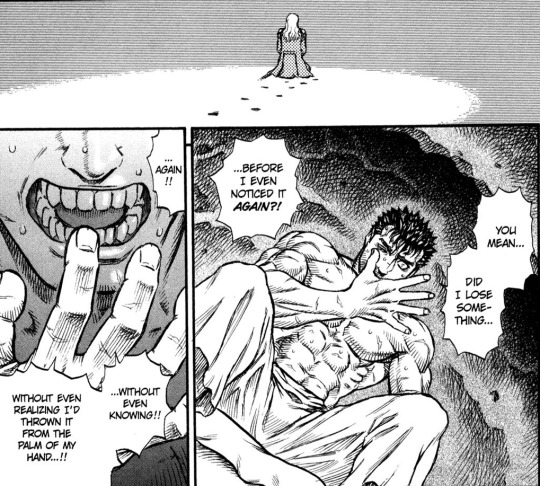
So, again, the King attacking Charlotte is not an actual objective parallel; it’s a parallel when filtered through Griffith’s false framing of what happened between him and Guts as a vicious rejection, which ofc fits because Griffith is the one bringing it all up and condemning both the King and himself.
At the end of the day I don’t particularly care whether “If I can’t have him, I don’t care,” is taken as a super dark moment or barely a drop in the pond when it comes to dark things people do in Berserk. Judge Griffith harshly for it or go ‘meh people try to kill each other in Berserk all the time, he wasn’t even trying so much as accepting the possibility,’ I just want to draw a clear distinction between that and a father trying to rape his daughter, which I think is fair.
And now the King’s final condescending judgement.

“Such a worthless matter.” We know what that worthless matter is. The King thinks it was lust for Charlotte that landed him there, but we (and half the cast of Berserk, vocally) know that it was his feelings for Guts.
And on the very next page we transition to the King’s assault of Charlotte. The King is doing some projecting himself here - he mocks Griffith for destroying himself over lust for Charlotte (Guts) which is what the King immediately proceeds to do. This attempted rape decimates him as a person; the next time we see him he looks like he’s aged thirty years, and he’s growing senile - just as Griffith is tortured to irreversible physical damage after Guts’ rejection.
After Charlotte wakes up and screams a horrified no, we return to Griffith for the last page of the chapter:
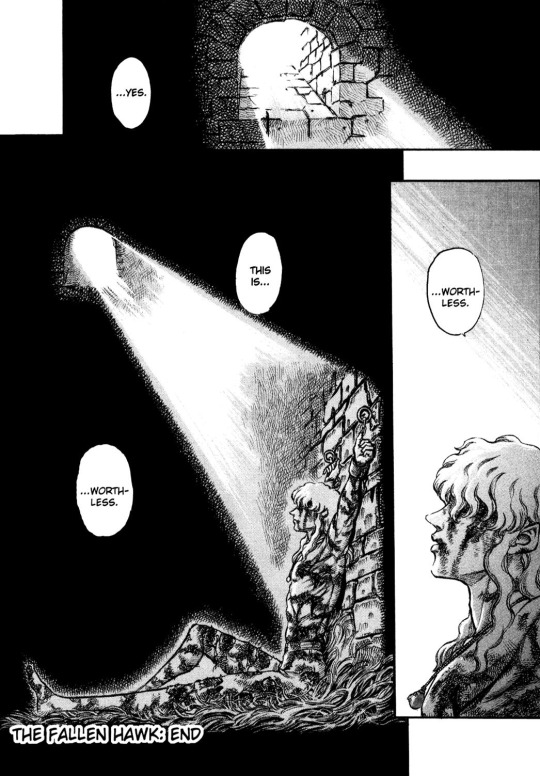
Charlotte’s assault is perfectly bookended by Griffith in the dungeon, and the repetition of “worthless,” a word used three times in this chapter.
The first time it refers overtly to the King not utilizing his power to justify his existence and assuage the guilt on his shoulders, instead comforting himself with Charlotte, with the implication that this is how Griffith feels having thrown away his dream over Guts.
The second time the King uses it to refer to the matter that Griffith destroyed himself over, ie stupid, impulsive actions based on feelings for another person. The King thinks it’s Charlotte, but we know it’s Guts.
The third time is how Griffith feels about himself, a final conclusive statement after his mockery of the King's feelings for Charlotte, the King’s accidental mockery of his feelings for Guts, and Charlotte’s assault. The way this chapter is structured essentially tells us that the attempted rape scene applies in some way to Griffith’s final declaration of his own worthlessness, and hopefully I’ve made a convincing case for how it’s an illustration of his self-loathing regarding his feelings for Guts.
Griffith, thrown into the darkness of the dungeon, may as well have been plunged into his own self-loathing. “Worthless.”
SO! What’s left? The torturer rips off Griffith’s behelit a short while later, nicely symbolic of the lost dream. A year passes. Guts returns. And Casca neatly condenses this enormous meta into the four sentences I stole for titles and writes the conclusion to this section for me:


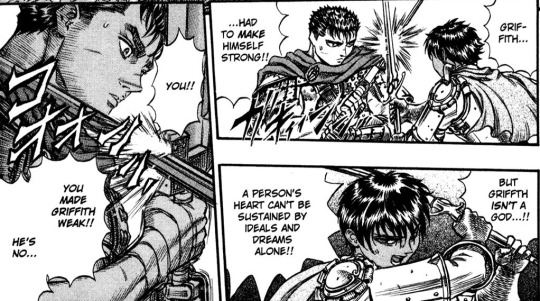
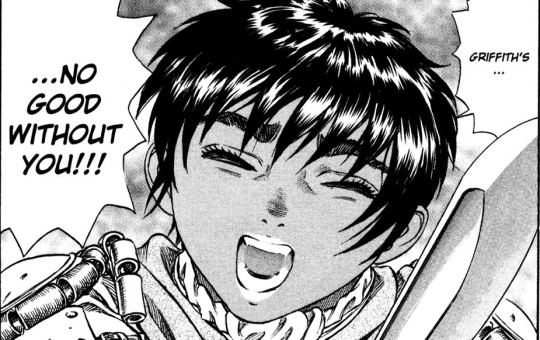
Griffith had to make himself strong - remember, that refers to the way he represses his emotions and projects his image of perfection, the way he smiled at Casca and put his hand on her shoulder after violently self harming.
Guts made Griffith weak because Griffith was starting to open up to him rather than repressing those emotions and relying solely on his dream to defend against everything that haunts him. Do I need a reason? It’s for those reasons that I’m asking you to do this. Do you think that I’m cruel?
After being rejected by Guts and believing that Guts sees him as a monster, the promise of his dream was no longer enough for him to rely on, and he crashed and burned in an implosion of self-loathing and feelings of worthlessness.
Griffith’s no good without Guts anymore because his feelings for Guts made him weak. He came to rely on Guts to sustain his heart, because people need other people, and Guts was the person Griffith needed.
Wish Casca could’ve written this whole thing for me, it would’ve been a lot shorter and neater lbr.
That’s the end of Part Three. The next and final part is going to explore how Guts growing more vital to Griffith than the dream leads, contrary to expectations, to Griffith sacrificing Guts for his dream.
Part 4 - Griffith’s no good without you
*** There is a common misconception that this is one big, thick scar rather than scratch marks, presumably thanks to the anime depicting it as such, but frankly, the anime got it wrong. There is zero reason for Griffith to have a scar there, and it would have no significance - Guts’ sword didn’t touch him, and if it had he’d have either a bruise or a gaping wound lol, not a scar. They are two parallel lines that you can see Griffith trace with two fingers right as he starts crying, and since we already know Griffith has a tendency to scratch himself, this leaves no doubt to me that they are two scratch marks, not one big mark of unknown origin.
*** I think the scene with Charlotte is deeply flawed, and I’m treating it as consensual sex in this analysis because I believe that’s what Miura intended it to be read as, despite shitty, misogynist, tropey writing. More on that here, if you’d like a further explanation.
*** I remember an old conversation I had with I think @yesgabsstuff and @mastermistressofdesire where one of you suggested that Griffith burning his life down by fucking Charlotte could be interpreted as a childish act of bargaining, at least subconsciously. Griffith trying to trade his dream for Guts. And I’m js, that rang true to me and this comparison made me remember it.
#griffguts#griffith#berserk meta#a#b#this is so long i'm sorry and i think the next part is even longer#character: griffith#theme: dreams#scene: tombstone of flame#theme: self loathing#theme: coping mechanisms#theme: self harm#arc: ga#scene: second duel#scene: casca's flashback
166 notes
·
View notes
Text
Epic Movie (Re)Watch #155 - Star Trek II: The Wrath of Khan
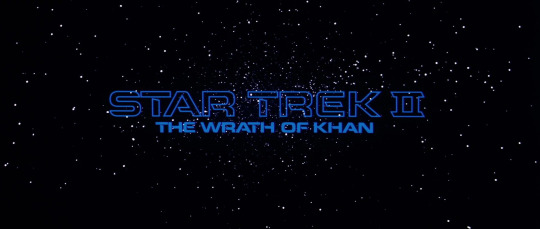
Spoilers Below
Have I seen it before: Yes
Did I like it then: Yes.
Do I remember it: Yes.
Did I see it in theaters: Yes.
Was it a movie I saw since August 22nd, 2009: Yes. #429.
Format: Blu-ray
1) Before anything else, I will say this: you never need to see Star Trek: The Motion Picture unless you are a MAJOR fan of the series. Wrath of Khan is a much better first film for the series and just a much better film in general, and the original motion picture has no bearing on the plot of ANY of the sequels that I’m aware of. Spare yourself the boredom.
2) I don’t often talk about how great the opening credits of a film are, but the movement through the stars and James Horner’s grand score creates a rousing score which helps you get in the mood for the space adventure to come.
3) The Kobayashi-Maru.
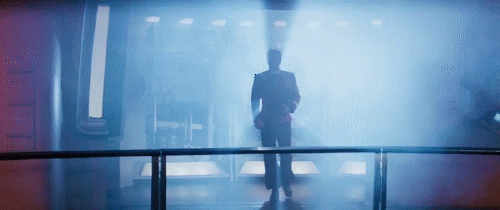
The opening of the film is great largely because it plays with expectations vs reality. You EXPECT Kirk in the captain’s chair, and while it plays out like a standard scene from “Star Trek” but it ends with everyone dead. And even though it turns out to be a simulation, the image of watching almost all the series regulars die before you prepares you for the darkness to come. It is an incredibly great and memorable opening to a film which can be described as the same.
4) Kirstie Alley as Saavik.
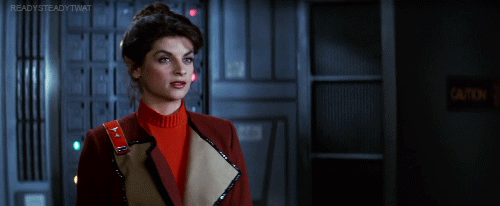
Despite being Vulcan (and, depending on what you consider canon, half-Romulan) Saavik has more in common with Kirk than she does with Spock. She may have the appearance of being a logical and decisive creature, but she is stubborn and proud. And I love her for that. I think Saavik as at her best in this film when played by Alley (she would be replaced in Star Trek III and IV). Alley gives Saavik a unique flavor, making her more than just your typical Vulcan and holding her own with the original cast.
5) The scene where Bones and Kirk “celebrate” his birthday is great.
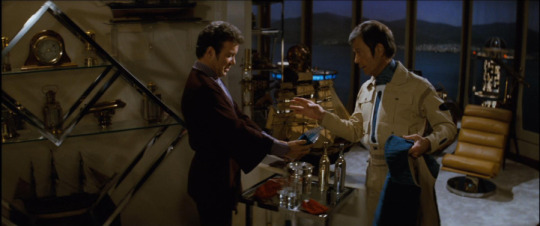
This is the introduction of Kirk’s key conflict and possibly the best analysis of it the film features.
Kirk: “Galloping around the cosmos is a game for the young, doctor.”
Bones [later]: “This is not about age and you know it.”
Kirk’s conflict here is not about aging, it is about aging INTO something. About being stuck behind a desk and bureaucracy. Of becoming obsolete. Age on it’s own does not result in that, but the choices we make as we age. It is in this film that Kirk will have to determine his future when faced with a threat from the past.
6) Carol Marcus and her son David.

Both Carol and David as individual characters are interesting, but by balancing out each other (with Carol being well reasoned and patient and David being more like Kirk with his stubbornness/rashness) they create an interesting dynamic that entertains in a way beyond their relationship with Kirk.
7) Ricardo Montalbán as Khan Noonien Singh.
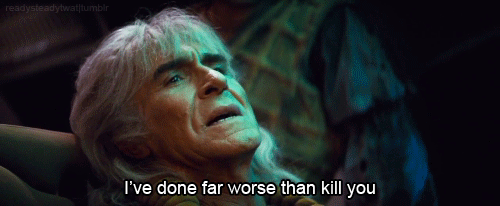
Montalbán takes a memorable role from the original series and in this film turns it into not only one of the greatest villains cinema has ever featured but also a career defining performance. Khan is able to be both chillingly collected and show off fear-inducing anger. His intellect, physical strength, and progressing madness/drive is showed off brilliantly by Montalbán. There is a ruthlessness to this character established as soon as we meet him (specifically with his use of brain slugs) that let’s us know, “Oh shit, don’t mess with this guy.” He is totally frightening, with many of his decisions and scenes making your stomach turn. Only open my third (fourth?) viewing of this film did I realize just how long his intro scene is, but it doesn’t feel long. It is perfect, and Montalbán captures your attention for the entire time.
8) Hey that’s...that’s Tony from the Witch Mountain movies!
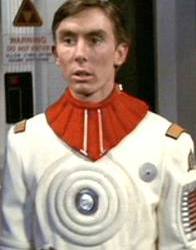
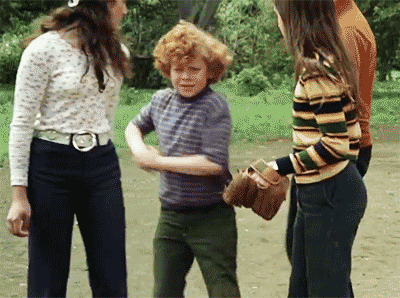
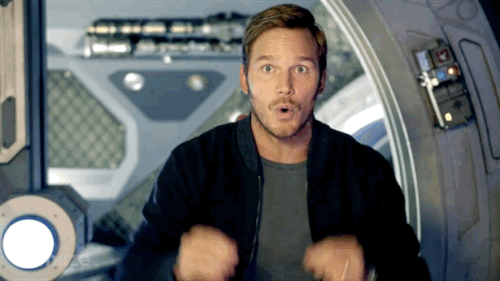
I would not have noticed that if I didn’t watch the Witch Mountain movies in March for the (Re)Watch.
9) So usually at this point in the (Re)Watch I talk about the writing and performances of the main cast of a film. I find it nearly impossible to do that for Wrath of Khan however as the cast from the original series are such mainstays of cinema and pop culture I’ve no idea what to say. What on earth could I possible say Kirk, Bones, Spock, Uhura, Scotty, Sulu, and Chekov that hasn’t been said before? In my analysis of the 2009 film I probably will, but right now I think I’ll just say they’re great and leave it at that.
10) I love how Kirk is freaking out when Spock lets Saavik pull the Enterprise out of dock.
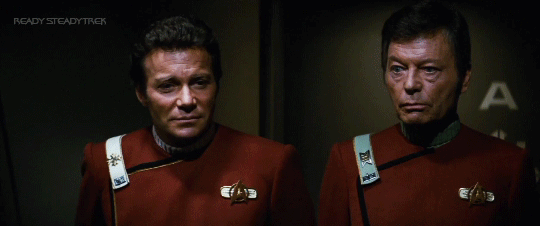
(GIF originally posted by @readysteadytrek)
11) I love Saavik and Kirk in the elevator. It speaks not only to how rash she is (which I love on it’s own) but will later show how similar they really are. She doesn’t really believe in a no-win scenario and as we’ll learn later neither does Kirk.

12) I love when Spock hands the ship over to Kirk. There is no bruised ego (as he himself says), there are no hard feelings, it’s not an issue of power or anything. He knows Kirk is the best guy to take the wheel. He trusts Kirk and Kirk trusts Spock back and they can just cut through the bullshit and do what’s best for everyone. I’m a sucker for good friendships like that.
13) Damn, Spock.
Kirk: “I would not presume to debate you.”
Spock: “That would be wise.”
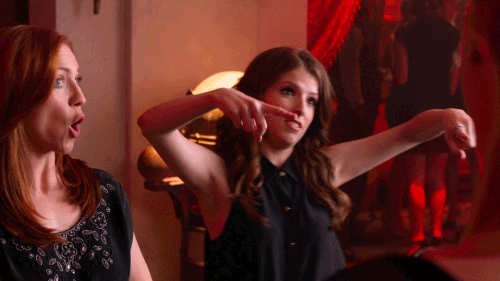
14) There is one scene early-to-mid picture which is recalled HEAVILY later on and I always think it is best when the ending of the movie ties into something at the beginning of the film. You want it to feel like one picture, you don’t want to be sitting at the end going, “Oh right, that part early on was the same movie.” Spock’s speaking of how...

And how he has been and always shall be Kirk’s friend tie together at the end in very heartbreaking ways.
15) I was always impressed with the Genesis visual, keeping in mind this was 1982 and CGI was hardly in its prime.
youtube
16) The very first encounter with the ship Khan has taken over - Reliant - before they know it is Khan is incredibly tense and Hitchcockian. Because we as the audience KNOW it’s Khan. Pacing is derived not from faster pacing but from slower pacing. The uneasiness simmers in our bones as Kirk unknowingly wanders into a trap, even though everyone seems to suspect something is up. And it features one of the best quotes in the film:
Khan: “Do you know the Klingon proverb that tells us revenge is a dish best served cold? It is very cold in space.”
17) And then Khan and Kirk finally encounter one another.

Montalbán and Shatner never share any scenes as Montalbán was making “Fantasy Island” at the time, but that does not undermine just how equally matched these adversaries are. Their very first encounter in particular feels like a chess game. It is not so much a battle of strengths as it is a battle of wits, yet still very interesting. And we as the audience really have no idea who is going to come out on top. Each is able to surprise and throw the other off balance, only to come back and deal another blow. It makes for great conflict. We know Kirk’s disadvantage: Khan is genetically engineered to be better than him. But in this scene we see a weakness of Khan’s which will become greater later on: his ego. He cannot see his own weaknesses and shortcomings. He is hundreds of years old comparatively speaking, so obviously some ways of thinking are foreign to him. But he can’t get past the fact he’s a genetically engineered super being to work on this. I love bad guys with flaws.
18) Oh no! Tony dies!

Preston [Ike Eisenmann’s character, after Kirk arrives]: “Is the word given, admiral?”
Kirk: “The word is given. Warp speed.”
[Preston dies]
Scotty [obviously torn up]: “He stayed at his post when the trainees ran!”
The fact that this death of a character we spent all of thirty seconds with packs such an intense punch speaks greatly to the craft with which this film was made.
19) The scene with Kirk, Bones, and Saavik on the scientist space station feels very Alien and I love it. For just a few minutes we are in a horror film, in an enclosed space where obviously SOMETHING is wrong and some sort of danger lurks. It is pulled off wonderfully well.
youtube
20) Part of the tension comes from the fact that we TRUST Chekov. He’s original series cast and he seems to have shaken the alien slug Khan was using on him. Why WOULDN’T we trust Chekov? Making the fact that he and his captain are still controlled later on all the more powerful.
21) This. Freaking. Scene.
youtube
This is when both are pushed to their furthest. Khan believes he has killed Kirk only to immediately learn he hasn’t, and Kirk is beyond pissed with Khan for all the death and destruction he has caused. This is where Khan accepts that he has defeated Kirk if only because it has become so difficult to kill him and it is where Kirk hates Khan the most (uttering the film’s famous line, “Khaaaaaan!”). But even through his hate Kirk is trying to play Khan. He is trying to get Khan in the same room with him so he can fight him face to face. But Khan is too smart for that and works against Kirk, leading to that yell. This is one of the best scenes in the film and it is because the conflict plays out so wonderfully.
22) The fact that David is Kirk’s son not only gives Kirk some personal stakes, but it ties into the idea of the choices Kirk must make in life. He is now dealing with two choices which are coming back to haunt him: how he handled Khan and not being a part of his son’s life. And that will directly influence the choices he makes in the future. Because life is too short.
23) This is so indicative of Kirk’s character.
Saavik: “Admiral, may I ask you a question?”
Kirk: “What's on your mind, Lieutenant?”
Saavik: “The Kobayashi Maru, sir.”
Kirk: “Are you asking me if we're playing out that scenario now?”
Saavik: “On the test, sir... will you tell me what you did? I would really like to know.”
Bones: “Lieutenant, you are looking at the only Starfleet cadet who ever beat the no-win scenario.”
Saavik: “How?”
Kirk: “I reprogrammed the simulation so it was possible to rescue the ship.”
Saavik: “What?”
David: “He cheated.”
Kirk: “I changed the conditions of the test; got a commendation for original thinking. I don't like to lose.”
Saavik: “Then you never faced that situation... faced death.”
Kirk: “I don't believe in the no-win scenario.”
24) The climactic chase through the nebula ties into Khan’s biggest weakness: his ego preventing him from admitting his flaws.
Spock: “He’s intelligent but not experienced. His pattern suggest two-dimensional thinking.”
I think this is the past scene to showcase space as a three-dimensional space. Ever watch a space film where characters encounter an asteroid field and think, “Why can’t they just go above or below it?” That’s what this film does. Like the initial Kirk/Khan mental face-off, the time in the nebula greats great tension from slowing down pacing while never being boring. There are surprises, there are twists, and they are on truly equal footing. And Khan, well he’s at his breaking point. How mad must this person be if even his crew - who were established to live and die by his word at the beginning of the film - are questioning his judgment? And what exactly will it lead him to?
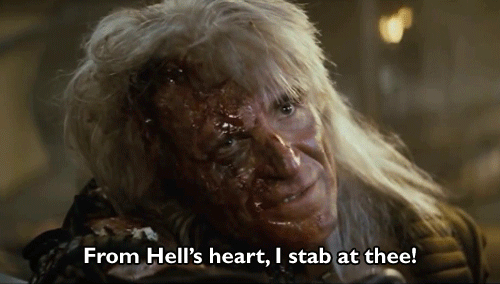
That final visual of Khan’s face is also a great presentation of how he is on the inside. He is torn up and burned to a crisp with vengeance, and now he will die that way.
25) Spock’s ultimate fate.

First of all, he KNOWS what he’s about to do. You can see it on his face before he goes to the reactor room to save the ship: he is fully aware that this will lead to his death and it does nothing to change his decision. And even though Khan has died, he has succeeded in his goal to, “keep on hurting,” Kirk from beyond the grave by killing his best friend.
Kirk [trying to get to Spock]: “He’ll die!”
Scotty: “He’s dead already.”
There is this intense feeling of sorrow and helplessness as we watch one of the greatest - if not the greatest - characters to come out of the original series die, tying into the conversation he and Kirk had earlier.
Spock: “The needs of the many...”
Kirk: “Outweigh the needs of the few.”
Spock: “Or the one.”

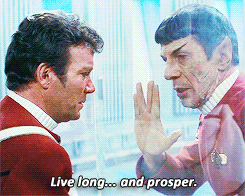
26) David and Kirk unfortunately don’t get too many moment together, just the two of them. But he did help Kirk through this tough time in his life.
David: “Lieutenant Saavik was right. You never have faced death.”
Kirk: “Not like this.”
David: “You knew enough to tell Saavik that how we face death is at least as important as how we face life.”
Kirk: “Just words.”
David: “But good words. That's where ideas begin. Maybe you should listen to them. I was wrong about you. And I'm sorry.”
Kirk: “Is that what you came here to say?”
David: “Mainly. And also that I'm proud - very proud - to be your son.”
27) But of course, this is a sci-fi movie...

Death is not as permanent as we like to think.
The Wrath of Khan is quite possibly the best film in the entire Star Trek canon. It balances high-stakes action and adventure with the intelligence, philosophy, and thought expected from the series. Ricardo Montalbán is freaking fantastic as Khan, with the rest of the cast delivering standout performances as well. The direction and writing blend together beautifully and it is just an incredibly fun and well done film. If you haven’t seen any Star Trek and you want to, Wrath of Khan is a very good film to start on.
#Star Trek#Ricardo Montalban#Leonard Nimoy#William Shatner#The Wrath of Khan#Epic Movie (Re)Watch#Kirstie Alley#Ike Eisenmann#Boom#Movie#Film#GIF
59 notes
·
View notes